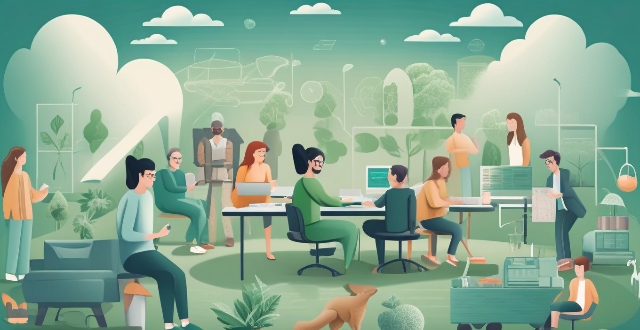The impact of climate change extends beyond environmental changes to significantly affect social structures and human relationships. This includes alterations in living conditions such as resource scarcity and habitat loss, economic disruptions like job market fluctuations and industry adaptations, increased social stress and migration, health implications including direct effects and mental health considerations, political and governance challenges involving policy implementation and legal frameworks, and cultural shifts towards environmental consciousness and education. These transformations necessitate societal adaptation and evolution to confront the multifaceted challenges posed by a changing climate.

The Impact of Climate Change on Social Structures and Relationships
Climate change is a global phenomenon that affects not just the environment but also human societies in profound ways. The alterations in weather patterns, temperatures, and natural resource availability can significantly influence how communities are structured and how individuals within those communities relate to each other. Here's a detailed look at these impacts:
Changes in Living Conditions
*Resource Scarcity*
- Water Shortages: Arid regions become less habitable, leading to migration and potential conflict over water resources.
- Food Insecurity: Changes in rainfall patterns affect agriculture, which can lead to food shortages and increased prices.
*Habitat Loss*
- Coastal Erosion: Rising sea levels threaten coastal communities, often forcing residents to relocate.
- Extreme Weather Events: More frequent and intense storms, droughts, and fires destroy homes and displace populations.
Economic Disruptions
*Job Market Fluctuations*
- Agriculture: Unpredictable weather makes farming more challenging, affecting jobs in this sector.
- Tourism: Areas that rely on seasonal tourism might see declines due to changing climate conditions.
*Industry Adaptations*
- Renewable Energy: A shift towards renewable energy sources creates new job opportunities but also leads to job losses in traditional energy sectors.
- Infrastructure Development: Investment in climate-resilient infrastructure can stimulate economies but requires significant funding.
Social Stress and Migration
*Population Displacement*
- Internal Migration: People move away from areas affected by climate change, straining resources in new locations.
- International Migration: Climate refugees seek safety in other countries, potentially leading to cultural and economic tensions.
*Community Cohesion*
- Loss of Traditions: As communities relocate, traditional practices and cultural heritage may be lost or altered.
- Social Support Networks: New communities must develop support systems as existing ones are disrupted by migration.
Health Implications
*Direct Health Effects*
- Heat-Related Illnesses: Increased temperatures lead to heat stroke and other heat-related health issues.
- Spread of Diseases: Warmer climates can expand the habitats of disease-carrying organisms like mosquitoes.
*Mental Health Considerations*
- Anxiety and Depression: Fear of climate-related disasters and uncertainty about the future can contribute to mental health problems.
- Intergenerational Trauma: Future generations facing the consequences of past actions can experience unique stressors related to climate change.
Political and Governance Challenges
*Policy Implementation*
- Adaptation Measures: Governments must develop policies to help societies adapt to changing climates.
- Mitigation Efforts: Reducing greenhouse gas emissions requires international cooperation and policy changes.
*Legal Frameworks*
- Climate Justice: Legal frameworks must address the disproportionate impact of climate change on vulnerable populations.
- Refugee Laws: Existing laws may need revision to accommodate climate refugees seeking asylum.
Cultural Shifts
*Environmental Consciousness*
- Sustainable Practices: Societies adopt more sustainable practices out of necessity and ethical considerations.
- Eco-Identity: Environmental concerns become integral to individual and group identities.
*Education and Awareness*
- Climate Education: Educational systems incorporate climate change into curricula to raise awareness and promote adaptation strategies.
- Media Influence: Media plays a crucial role in shaping public opinion and promoting climate action.
In conclusion, climate change profoundly affects social structures and relationships by altering living conditions, economic stability, health outcomes, political landscapes, and cultural norms. These changes require societies to adapt and evolve in response to the challenges presented by a shifting climate.